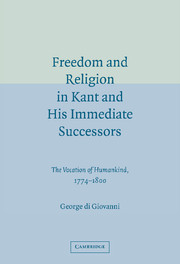Book contents
- Frontmatter
- Contents
- Preface
- Abbreviations
- 1 Introduction: The Vocation of Humankind, 1774
- 2 The Taming of Kant: Popular Philosophy
- 3 The Intractable Kant: Schultz, Jacobi, Reinhold
- 4 Of Human Freedom and Necessity
- 5 Kant's Moral System
- 6 The Difference That Fichte Made
- 7 The Parting of the Ways
- 8 The Vocation of Humankind Revisited, 1800: Conclusion
- Notes
- Bibliography
- Index
3 - The Intractable Kant: Schultz, Jacobi, Reinhold
Published online by Cambridge University Press: 24 July 2009
- Frontmatter
- Contents
- Preface
- Abbreviations
- 1 Introduction: The Vocation of Humankind, 1774
- 2 The Taming of Kant: Popular Philosophy
- 3 The Intractable Kant: Schultz, Jacobi, Reinhold
- 4 Of Human Freedom and Necessity
- 5 Kant's Moral System
- 6 The Difference That Fichte Made
- 7 The Parting of the Ways
- 8 The Vocation of Humankind Revisited, 1800: Conclusion
- Notes
- Bibliography
- Index
Summary
THE CANONICAL INTERPRETATION
Abicht, Schmid, or Weishaupt might not have been philosophical luminaries, but in their varying reactions to Kant they all gave clear expression to a naturalism typical of the late Aufklärung. By contrast to other contemporary more crude reactions, their efforts appear even elegant. Weishaupt was notorious in his day mostly because of his connections with the Illuminati and because of some shady aspects of his life. Reinhold wondered why Weishaupt wrote so much against Kant when, as Reinhold thought, he misunderstood him altogether. The judgment was not altogether fair. There were difficulties in Kant's system on which Weishaupt capitalized. But the judgment was also the expression of a general tendency to shun Weishaupt because of his materialistic views – the kind that would have been widely regarded in Germany as morally reprehensible. Schmid is remembered today mostly because of his quarrels with Reinhold and Fichte, while Abicht is not remembered at all. In their own time, the two men (Schmid and Abicht) made an impression nonetheless because of their teaching activities and the sheer massiveness of their publications, all of them intended as textbooks. At any rate, whatever their actual philosophical merit, and perhaps even because of their lack of it, they provide for us today a perfect illustration of how Popularphilosophie was able to remold the Critique of Reason according to its own presuppositions.
- Type
- Chapter
- Information
- Freedom and Religion in Kant and his Immediate SuccessorsThe Vocation of Humankind, 1774–1800, pp. 66 - 107Publisher: Cambridge University PressPrint publication year: 2005

